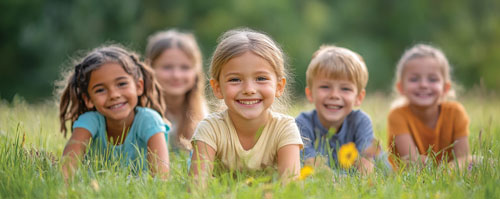
by Jennifer Clary
Little Growers Farm
Children today face a brand-new frontier, defined by rapidly evolving technologies that have been baked into their lives since birth. While their Millennial and Gen Z parents fondly remember childhoods with books and hours spent in the playground, Generation Alpha children born between 2010 and 2024 are growing up with screens and touch interfaces as the predominant stimuli.
The UK’s Education Committee published an astonishing report just a few months ago which tracked a 52% increase in children’s screen time between 2020-2022, providing evidence that nearly 25% of children exhibit smartphone usage consistent with a behavioural addiction. This report also revealed that 20% of children in the UK between three and five years old have their own mobile phone! Back in the early 1980s when I was navigating young life, my time was spent kicking a ball around at the park or play acting with my younger brother. Technology fancier than Skip-It and Teddy Ruxpin was the furthest thing from my mind!
Recently I attended an Ignite Women in Business brunch hosted by the indomitable Natalie Montagnani. Many of the women in attendance were mums as well as business owners, so the conversation naturally touched on our collective concerns for Generation Alpha and, importantly, what we can actively do to support children’s healthy development and preparedness. The overwhelming consensus was to encourage more outdoor, hands-on and screen free play.
Here’s why:
1. Physical fitness matters
Being in nature encourages active play and normalises daily physical activity for children as an important, healthy habit. Yet more than 400 playgrounds have closed across our country since 2012, decreasing readily accessible outdoor areas for children. One of the greatest supports that parents can provide to children is seeking out safe, engaging outdoor locations for play. We are lucky here in Sussex as we have many places locally where children can run wild and play freely whether that be a beach, park or forest. After all, it doesn’t matter how technically proficient our offspring are if they’re physically unwell.
There’s an old adage “You have 1,000 problems until you have a health problem – then you only have one problem”. It’s true. Teaching children the benefit of prioritising physical fitness is a lifelong gift.
2. Executive function is developed, not inherited
Unstructured play time is the best way for children to build the skills to help them plan, prioritise, troubleshoot, negotiate and multi-task. Being outside gives children the opportunities they need to practise these vital skills.
3. Taking risks is necessary on the path to success
As human beings, we all need to take risks to achieve our goals. Taking risks can be uncomfortable, but when children are encouraged to push boundaries in their youth, they are better prepared to take big dream-building swings as adults! Climbing a tree, balancing on a log and other outdoor challenges build confidence and teach children that – even when taking a risk falls flat – the lessons they learn from failure are valuable and empower them to ultimately realise success.
4. Nature needs protecting
Having been born into a society that emphasises technology means that Generation Alpha will only learn to appreciate nature if we model the importance of environmental protection. Children who spend quality time playing outdoors are more likely to become adults who advocate for our planet. It is not a given that future generations will be able to walk in the woods, view animals in their natural habitats or play in a stream. Generation Alpha’s behaviours will largely dictate what becomes of our Earth and so it falls mainly to us, their parents, to provide this most important education.
5. Outdoor play boosts brain function for life
Research has shown that the increased oxygen levels from being outdoors enhances cognitive performance and that the expansiveness of nature provides a respite from the over-stimulation of indoor, screen-dominated spaces. Outside ‘brain breaks’ allow for improved information processing and better learning outcomes. So even if your child is a tech whiz destined for a career as a drone manager, cybersecurity expert, or virtual habitat designer, playing outside lays the strongest possible foundation for their future.
At the end of the day, I am not a Luddite. My own children, aged four and five, revel in Bluey and enjoy listening to GoKidGo podcasts like Snoop and Sniffy or Story Train from my phone while building with magnetic blocks. After all, I recognise that Generation Alpha is indeed facing a NEW frontier: one which old school Millennials like me are grappling to keep up with in real time and the full possibilities of which are almost impossible to imagine. Technology will undoubtedly transform the future in many positive ways as well as negative ones, and I certainly believe that there is a need to educate our young people about the realities of their world, from robotics to AI. But, as human beings, it is vital to remember that we are more than simply machines. Outdoor play is a key developmental experience and, despite exponential advancements in the tools we use, preserving this most foundational education for our children should be the highest priority.
Jennifer Clary is the founder of Little Growers Farm, a summer pop-up for art, science and play.
From making lava lamps to catching bubbles, there’s something for every family to enjoy
at Little Growers Farm! www.littlegrowersfarm.co.uk











